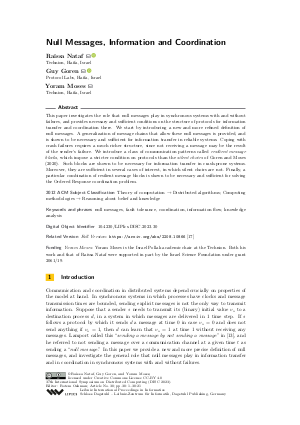Null Messages, Information and Coordination
Authors
Raïssa Nataf  ,
Guy Goren
,
Guy Goren  ,
Yoram Moses
,
Yoram Moses
-
Part of:
Volume:
37th International Symposium on Distributed Computing (DISC 2023)
Part of: Series: Leibniz International Proceedings in Informatics (LIPIcs)
Part of: Conference: International Symposium on Distributed Computing (DISC) - License:
 Creative Commons Attribution 4.0 International license
Creative Commons Attribution 4.0 International license
- Publication Date: 2023-10-05
File

PDF
LIPIcs.DISC.2023.30.pdf
- Filesize: 1.38 MB
- 21 pages
Document Identifiers
Related Versions
- Full Version https://arxiv.org/abs/2208.10866
Subject Classification
ACM Subject Classification
- Theory of computation → Distributed algorithms
- Computing methodologies → Reasoning about belief and knowledge
Keywords
- null messages
- fault tolerance
- coordination
- information flow
- knowledge analysis
Metrics
- Access Statistics
-
Total Accesses (updated on a weekly basis)
0PDF Downloads0Metadata Views
Abstract
This paper investigates the role that null messages play in synchronous systems with and without failures, and provides necessary and sufficient conditions on the structure of protocols for information transfer and coordination there. We start by introducing a new and more refined definition of null messages. A generalization of message chains that allow these null messages is provided, and is shown to be necessary and sufficient for information transfer in reliable systems. Coping with crash failures requires a much richer structure, since not receiving a message may be the result of the sender’s failure. We introduce a class of communication patterns called resilient message blocks, which impose a stricter condition on protocols than the silent choirs of Goren and Moses (2020). Such blocks are shown to be necessary for information transfer in crash-prone systems. Moreover, they are sufficient in several cases of interest, in which silent choirs are not. Finally, a particular combination of resilient message blocks is shown to be necessary and sufficient for solving the Ordered Response coordination problem.
Cite As Get BibTex
Raïssa Nataf, Guy Goren, and Yoram Moses. Null Messages, Information and Coordination. In 37th International Symposium on Distributed Computing (DISC 2023). Leibniz International Proceedings in Informatics (LIPIcs), Volume 281, pp. 30:1-30:21, Schloss Dagstuhl – Leibniz-Zentrum für Informatik (2023)
https://doi.org/10.4230/LIPIcs.DISC.2023.30
BibTex
@InProceedings{nataf_et_al:LIPIcs.DISC.2023.30,
author = {Nataf, Ra\"{i}ssa and Goren, Guy and Moses, Yoram},
title = {{Null Messages, Information and Coordination}},
booktitle = {37th International Symposium on Distributed Computing (DISC 2023)},
pages = {30:1--30:21},
series = {Leibniz International Proceedings in Informatics (LIPIcs)},
ISBN = {978-3-95977-301-0},
ISSN = {1868-8969},
year = {2023},
volume = {281},
editor = {Oshman, Rotem},
publisher = {Schloss Dagstuhl -- Leibniz-Zentrum f{\"u}r Informatik},
address = {Dagstuhl, Germany},
URL = {https://drops.dagstuhl.de/entities/document/10.4230/LIPIcs.DISC.2023.30},
URN = {urn:nbn:de:0030-drops-191564},
doi = {10.4230/LIPIcs.DISC.2023.30},
annote = {Keywords: null messages, fault tolerance, coordination, information flow, knowledge analysis}
}
Author Details
Funding
- Moses, Yoram: Yoram Moses is the Israel Pollak academic chair at the Technion. Both his work and that of Raïssa Nataf were supported in part by the Israel Science Foundation under grant 2061/19.
References
-
Eugene S. Amdur, Samuel M. Weber, and Vassos Hadzilacos. On the message complexity of binary byzantine agreement under crash failures. Distributed Computing, 5(4):175-186, 1992.

- Ido Ben-Zvi and Yoram Moses. On interactive knowledge with bounded communication. Journal of Applied Non-Classical Logics, 21(3-4):323-354, 2011. URL: http://jancl.e-revues.com/article.jsp?articleId=17078.
-
Ido Ben-Zvi and Yoram Moses. Beyond lamport’s happened-before: On time bounds and the ordering of events in distributed systems. Journal of the ACM (JACM), 61(2):1-26, 2014.

-
K. M. Chandy and J. Misra. How processes learn. Distributed Computing, 1(1):40-52, 1986.

-
Danny Dolev. The byzantine generals strike again. Journal of algorithms, 3(1):14-30, 1982.

- Ronald Fagin, Joseph Y Halpern, Yoram Moses, and Moshe Y Vardi. Reasoning About Knowledge. MIT Press, 1995. URL: https://doi.org/10.7551/mitpress/5803.001.0001.
- Guy Goren and Yoram Moses. Silence. J. ACM, 67:3:1-3:26, 2020. URL: https://doi.org/10.1145/3377883.
- Guy Goren and Yoram Moses. Optimistically tuning synchronous byzantine consensus: another win for null messages. Distributed Comput., 34(5):395-410, 2021. URL: https://doi.org/10.1007/s00446-021-00393-8.
- Rachid Guerraoui and Jingjing Wang. How fast can a distributed transaction commit? In Emanuel Sallinger, Jan Van den Bussche, and Floris Geerts, editors, Proceedings of the 36th ACM SIGMOD-SIGACT-SIGAI Symposium on Principles of Database Systems, PODS 2017, Chicago, IL, USA, May 14-19, 2017, pages 107-122. ACM, 2017. URL: https://doi.org/10.1145/3034786.3034799.
-
Vassos Hadzilacos and Joseph Y. Halpern. Message-optimal protocols for byzantine agreement. Mathematical Systems Theory, 26(1):41-102, 1993.

-
Alex Kogan and Erez Petrank. A methodology for creating fast wait-free data structures. In ACM SIGPLAN Notices, volume 47, pages 141-150. ACM, 2012.

-
L. Lamport. Time, clocks, and the ordering of events in a distributed system. Communications of the ACM, 21(7):558-565, 1978.

- Leslie Lamport. Using time instead of timeout for fault-tolerant distributed systems. ACM Trans. Program. Lang. Syst., 6:254-280, 1984. URL: https://doi.org/10.1145/2993.2994.
- Kfir Lev-Ari, Alexander Spiegelman, Idit Keidar, and Dahlia Malkhi. Fairledger: A fair blockchain protocol for financial institutions. In Pascal Felber, Roy Friedman, Seth Gilbert, and Avery Miller, editors, 23rd International Conference on Principles of Distributed Systems, OPODIS 2019, December 17-19, 2019, Neuchâtel, Switzerland, volume 153 of LIPIcs, pages 4:1-4:17. Schloss Dagstuhl - Leibniz-Zentrum für Informatik, 2019. URL: https://doi.org/10.4230/LIPIcs.OPODIS.2019.4.
-
Barbara Liskov. Practical uses of synchronized clocks in distributed systems. Distributed Computing, 6(4):211-219, 1993.

- Yoram Moses. Relating knowledge and coordinated action: The knowledge of preconditions principle. In Proceedings of TARK,, pages 231-245, 2015. URL: https://doi.org/10.48550/arXiv.1606.07525.
- Raïssa Nataf, Guy Goren, and Yoram Moses. Null messages, information and coordination, 2023. URL: https://arxiv.org/abs/2208.10866.
